Barcelona (Spain)
Cruise Port schedule, live map, terminals, news
Region
Mediterranean - Black Sea
Local Time
2025-04-06 09:49
 61°F
61°F 16.2°C

 Light breeze
Light breeze2.9 m/s
 76 °F / 25 °C
76 °F / 25 °C 54 °F / 13 °C
Port Barcelona cruise ship schedule shows timetable calendars of all arrival and departure dates by month. The port's schedule lists all ships (in links) with cruises going to or leaving from Barcelona, Spain. To see the full itineraries (ports of call dates and arrival / departure times) and their lowest rates – just follow the corresponding ship-link.
| Day | Ship | Arrival | Departure |
|---|---|---|---|
| 1 February, 2026 Sunday | 01 Jan, 02:00 | ||
| 1 February, 2026 Sunday | 08:00 | 18:00 | |
| 2 February, 2026 Monday | 08:00 | 18:00 | |
| 3 February, 2026 Tuesday | |||
| 3 February, 2026 Tuesday | 05:00 | 17:00 | |
| 6 February, 2026 Friday | 08:00 | 18:00 | |
| 7 February, 2026 Saturday | 18:00 | ||
| 8 February, 2026 Sunday | 08:00 | 18:00 | |
| 9 February, 2026 Monday | 08:00 | 18:00 | |
| 13 February, 2026 Friday | 08:00 | 18:00 | |
| 14 February, 2026 Saturday | 08:00 | 18:00 | |
| 15 February, 2026 Sunday | 08:00 | 18:00 | |
| 16 February, 2026 Monday | 08:00 | 18:00 | |
| 19 February, 2026 Thursday | 01 Jan, 02:00 | ||
| 19 February, 2026 Thursday | 08:00 | 19:00 | |
| 20 February, 2026 Friday | 08:00 | 18:00 | |
| 21 February, 2026 Saturday | 08:00 | 18:00 | |
| 22 February, 2026 Sunday | 08:00 | 18:00 | |
| 23 February, 2026 Monday | 08:00 | 18:00 | |
| 26 February, 2026 Thursday | 13:00 | 28 Feb, 16:00 | |
| 27 February, 2026 Friday | 01 Jan, 02:00 | ||
| 27 February, 2026 Friday | 08:00 | 18:00 | |
| 28 February, 2026 Saturday | 16:00 | ||
| 28 February, 2026 Saturday | 08:00 | 18:00 | |
| 28 February, 2026 Saturday | 08:00 | 18:00 |
Barcelona cruise port is currently ranked the largest Mediterranean cruise port with turnaround operations (roundtrip itineraries) and the world's 4th busiest. Its harbor area is one of the world's biggest. By population (over 1,6 million) the city is ranked Spain's largest and Europe's 16th largest.
By the metro population (around 5,5 million) it is ranked EU's 6th largest (after Paris, London, Madrid, Ruhr, Milano). The city is on the Mediterranean Sea, located between the mouths of two rivers (Llobregat and Besos).
IMPORTANT: Since October 22, 2023, cruise vessels are no longer allowed to dock at Muelle Barcelona Norte (northern port, near the World Trade Centre area) and instead are redirected to berth at Moll Adossat Pier (southern port) which was previously utilized by larger cruise companies like NCL-Norwegian, RCI-Royal Caribbean and MSC. As a result, disembarking cruise tourists instead of stepping directly into the city's historic downtown (10-minute walking distance) are transported via shuttle buses (~30 minutes drive distance) from the southern port to access the city center.
Barcelona cruise port
Barcelona Port (locode ESBCN) is ranked Europe's 9th largest containership port by annual traffic.
The Port's area (sized 10 km2 / 4 mi2) is divided into 3 zones - Port Vell, Commercial Port, and Barcelona Free Port ("Zona Franca de Barcelona", industrial/logistics port).
There is an ongoing enlargement project that will double the port's size by diverting the Llobregat river to the south.
- UN-LOCODE (United Nations location code) - ESBCN
- supported by excellent road, rail, and air infrastructure
- deep harbor water and berths (draft 11,5 m / 38 ft)
- sheltered harbor area
- access unrestricted by tides
- capability to accommodate 9 cruise vessels at a time
Each of the Port's international cruise ship terminals has air conditioning, public phones, lifts and escalators, currency exchange kiosks, duty-free shops, gift/souvenir shops, cafe-restaurant, taxi rank, bus shuttle to downtown.
The cruise port is accessible the whole year round - 24/7, 365 days a tear.
The best vantage points to observe the cruise port's traffic are the cable car (connecting La Barceloneta neighborhood, Ciutat Vella district), the Ferry Station and the Montjuic Castle.
Cruise ships usually arrive in Barcelona in the early morning (4, 5, 6, 7, 9 am) and in the early afternoon (at 1, 2, 2:30 pm) and depart from Barcelona in the late afternoon or in the evening (at 5, 6, 7, 8:30, 10 pm).
Port Barcelona's cruise operations contribute to the city's economy (as revenues) around EUR 796 million (USD 900M) annually. The cruise port adds EUR 413 million (USD 467M) annually to Catalonia's GDP (gross domestic product). This industry also supports 6760 local jobs and generates EUR 152 million (USD 172M) in government taxes. Each cruise vessel in Barcelona generates on average EUR 1 million (USD 1,13M) in sales, contributes EUR 0,5 million (USD 565,417) to Catalonia's GDP, and generates EUR 0,2 million (USD 226,131) in Gov taxes.
In 2014, at its 6 existing cruise terminals, the seaport handled 764 ship calls and over 2,36 million passengers, with an economic impact of EUR 257 million (spent on restaurants, bars, visiting museums, churches, also on transportation and city shopping). On February 5, 2014, Royal Caribbean announced that for the summer 2015 season the Allure of the Seas ship will be based in Europe and homeported in Barcelona. Starting May 24, the Allure's program had 25 voyages with a repeating 7-night round-trip itinerary visiting the ports of Palma de Mallorca, Marseille, La Spezia, Civitavecchia-Rome, Naples. Right after the RCI's announcement, the Barcelona Port announced its estimation for the Allure's additional 158000 passengers and expected spending of around EUR 17,5 million in the city.
On July 23, 2015, Carnival Corporation announced its agreement with Barcelona Port Authority to invest over EUR 46 million in building a second (private) cruise terminal at Moll Adossat (read more in the "Terminal" section). The facility was opened on May 5, 2018. On September 13, 2015, the cruise port had its day record for cruise tourists, handling a total of 26,770 passengers on 4 cruise ships visiting the port in a single day. These were the vessels Norwegian Epic, Nieuw Amsterdam, Vision OTS and Allure OTS.
Port's cruise passenger growth in the period 2010-2015 was as follows: 2010 (2,350264 million, growth of 9,06%), 2011 (2,658691 million, growth of 13,06%), 2012 (2,408618 million, -9,4%), 2013 (2,599363 million, growth of 7,9%), 2014 (2,364292, -9%), 2015 (2,540302 million, growth of 7,4%).
The Port ended 2015 with more turnaround passengers (embarking in Barcelona) reporting 3,7+ million (a 7% increase). The number included regular ferry passengers (~1,1 million) and cruise ship passengers (~2,54 million). The biggest increase in passengers concerned those leaving on ships using Barcelona as a turnaround port (where the itinerary begins and ends). In 2015, the cruise port posted its highest-ever number of handled passengers (2,5+ million). In terms of home-ported ships, Barcelona was ranked Europe's second - following Port Venice.
In November 2016, Port Barcelona presented its "Air Quality Improvement Plan" - an initiative aiming to reduce bad emissions from port activities. The document involved 25 actions rolled out in 53 operations. Among the most representative actions are promoting the LNG fuel (liquefied natural gas) as an alternative for both marine vessels and road freighters. The policy offers discounts for cleaner ships and replacing the Port's service fleet with electric vehicles. According to statistics, port activities produce 7,6% of the city's average NOx concentrations annually and 1,5% of the fine particulates. Promoting LNG-powered ships, terminal machinery and trucks is one of the plan's highlights. LNG fuel cuts NOx emissions by 80% and eliminates soot, particles and SOx emissions. The environmental discounts are on port fees. Currently, the law allows a max 5% port fee discount for environmental reasons.
For season 2019, the cruise port had scheduled a total of 830 ship calls with estimated 3,2 million tourists.
In May 2021, MSC Cruises signed a deal to build an exclusive (for MSC-owned ships only) terminal in Port Barcelona. The 2025-opened "MSC Terminal H" is operated under a 31-year concession (through 2056).
In June 2022 the Port announced that starting in 2023, all visiting cruise ship tourists will pay an additional EUR 3 (12+ hours stay) and EUR 1 (fewer than 12 hours stay). The new port fees are added to the existing EUR 1,75 per person and are usually included in the cruise fares listed upon booking. For comparison, since 2019, Port Marghera-Venice charges EUR 10 port fee.
In 2024, Carnival Corporation installed a total of 1350 solar panels at two of its Barcelona cruise terminals in Barcelona - Palacruceros (Terminal D) and Helix Cruise Center (Terminal E). Both installations have combined capacity to generate over 100% of the energy required for daily operations. The solars produce 866,000+ kWh annually, with the surplus power (estimated at 32% for Terminal E/Helix) fed back into the city power grid, contributing an additional 245,000 kWh annually.
Port Barcelona statistics
FY2018 (fiscal) was a record year with significant growth in various sectors. Port's main trade is with China. Around 25% of all TEUs (containers shipped on large box ships) passing through the port start or end in China. In 2018 also increased the shipping trade with Algeria (+45%), USA (+18%), India (+4,4%), Mexico (+12,6%), Vietnam (+27,5%), Thailand (+18,7%), Egypt (+14%). "Motorways of the Sea" (Mediterranean routes connecting to Italy and North Africa) goods shipping volumes increased 7%.
These Mediterranean lines connect Barcelona to the ports Civitavecchia-Rome, Genoa (Milan), Savona, Livorno-Florence, Porto Torres (Sardinia Island), Tangier (Morocco), Algiers (Algeria) and La Goulette-Tunis.
- Liquid bulk (mainly hydrocarbons) grew 5,2% (to 15,2 million tons), LNG +3%, gasoline +12,6%, Biofuels +34,8%. Dry bulk cargo decreased 4,7%. Vehicle shipping decreased 3% (to 810,218 units). The port handled a total of 262,379 TEUs (+7,7%). Port's rail traffic increased 13,3%. Car transport by rail increased 11% (to 263,900 units).
- In 2018, the port handled total 4,4 million passengers (8,6% increase), including 1,4 million ferry (+2%) and 3 million cruise (+12%). Turnaround passengers grew 16%. Day-passengers grew 8%. Low-season cruisers increased 17% and were ~44% of all cruise passengers.
For 2018, Port Barcelona reported 4% increase in net turnover - EUR 173,5 million (USD 198 million), 8% increase in profit - EUR 53,7 million (USD 61,3 million) and 4% increase in cash flow - EUR 102,5 million (USD 117 million).
APM Terminals (global container terminal operator) operates under the concession port's container terminal. In 2019, APM Terminals Barcelona invested ~EUR 47 million in equipment (29x new straddle carriers/trucks, 2x new Super PostPanamax gantry cranes, 1x Reefer Rack with refrigerated container plugs) to improve terminal's efficiency and productivity. Also in 2019 APM increased terminal's reefer (refrigerated TEU-container) capacity by 31% (to a total of 632 reefer connections) and launched online real-time TEU tracking (on its website).
Cruise itineraries to and from Barcelona Spain
Follows a list of destinations visited by cruise ships leaving out of Barcelona:
- Mediterranean itineraries on cruises out of Barcelona port visit the largest ports of Italy, France, Greece, and Turkey. Feature destinations are also the French Riviera and the Italian Riviera (coastal regions with top-luxury resorts).
- The most commonly operated are 7-day round-trips. One-way itineraries from Barcelona end up in Civitavecchia-Rome, Genoa, Piraeus-Athens, Venice, Istanbul.
- Most of the Canary Islands itineraries leaving roundtrip from Barcelona also visit North Africa (Morocco) and Funchal (Madeira Island) often combined with other ports in Spain and Portugal.
- Short-break (Mini Cruises) from Barcelona to Genoa are 2-nights/3-days long are operated by MSC ships.
- Among the most visited Mediterranean island ports are Mallorca, Sicily, Corsica, Malta, Sardinia.
- World Cruises from Barcelona are offered mainly by Costa Cruises ships. The itineraries are usually eastbound (via Suez Canal) and visit ports in Southeast Asia, South Pacific (Australia, New Zealand), South America.
Ship relocation voyages (RepositionCruises.com) are one-way itineraries from Barcelona to the largest ports of the UK, Holland, Denmark, and the Canaries. Eastbound routes (transiting the Suez Canal) may end up in ports in Asia (Dubai, Singapore, Hong Kong) and even in Australia (Sydney NSW) on longer "around the world" itinerary segments.
Westbound Transatlantic crossings (on ship relocations out of Barcelona) are offered in the Fall (starting in late September - early October through the end of November). Among the special destinations that may be visited is Bermuda. The disembarkation could be in NYC New York, in some of the large Florida ports, also in Bridgetown (Barbados), Fort de France (Martinique), even in Havana (Cuba). The longest Transatlantic cruises out of Barcelona are on Costa ships repositioning from Europe to South America. They offer disembarkation in either Brazil (Rio De Janeiro, Santos-Sao Paulo) or Argentina (Buenos Aires).
Barcelona cruise terminal
Port Barcelona has a total of 8 cruise ship terminals, 4 ferry terminals, and 2 large yacht marinas. There are restaurants and cafes at most of the terminals.
(NEW) Catalonia Cruise Terminal G (Royal Caribbean)
In January 2024, RCG/Royal Caribbean Group became the solitary contender/only bidder for Barcelona Port's newest Cruise Terminal G. The bid was placed by the consortium "Catalonia Cruise Terminal G" including RCG and CTI/Cruise Terminals International Ltd (2022-founded, London England UK-based company that owns, develops and manages cruise port infrastructure).
The approval for Terminal G was granted in April 2024.
RCG will co-fund the project (total budget EUR 85 million/USD 92M), start the construction works, and also will be the managing company of Terminal G, scheduled for completion/inauguration in 2027-Q1.
The modern facility encompasses an area of 54000 m2 (581250 ft2) including a dock/quay with length 450 m (1476 ft), which allows berthing for the world's most colossal cruise vessels.
Initially, three companies - NCL/Norwegian, Viking OCEAN and Virgin Voyages - planned to participate in the bidding process. However, as the process resumed, Royal Caribbean remained the sole bidder.
One of the tender's stipulations was that the partner/participating entity could not hold a controlling interest in Terminal G.
Until 2024, through its subsidiary Creuers del Port de Barcelona, RCG held a 38% stake in Barcelona Port Investment - the entity that manages Barcelona's cruise terminals A, B, and C (at Adossat Dock), along with World Trade Center's two terminals. The remaining 62% were owned by the Turkish company Global Ports Holding/GPH. Since 2023, GPH is the sole proprietor of Creuers del Port de Barcelona's shares as RCG opted to divest its stake (38%) to ensure compliance with the Terminal G tender's conditions.
(NEW) MSC Cruise Terminal H
In May 2021, MSC was approved to build an exclusive (for MSC-owned ships only) terminal.
Construction works started in June (2021) and the completion and inauguration were initially planned for 2024.
Terminal H was unofficially opened on February 15, 2025, with the arrival of MSC Fantasia ship, with the official inauguration planned for the summer.
The facility is operated under a 31-year concession (2025 through 2056). It is sized 12500 m2 (134550 ft2) and was designed by Ricardo Bofill Architecture Studio.
The new MSC Cruise Terminal project was initially budgeted ~EUR 33M (~USD 40,2M) but eventually cost ~EUR 50M (~USD 60M).
The exclusive MSC Terminal H is expected to serve ~4 cruises weekly, or ~190 ship calls annually. The facility serves vessels from MSC Cruises and the sister-company Explora Journeys.
Port Vell/Maremagnum cruise terminal "M" (Old Port Barcelona)
The Port Vell port complex includes a fishing port, 2 yacht marinas, 1 cruise ship terminal, ferry terminal.
Terminal M ("Maremagnum", near the World Trade Center) serves both ferries and cruise vessels. It has 3 small piers - "South Pier" (S), "North Pier" (N) and "East Pier" (E).
All terminals are designed to serve smaller ships. Their location is near the World Trade Center (which has a dedicated cruise parking area) and the Eurostars Grand Marina Hotel.
The Maremagnum terminal (aka "Port Vell terminal") is the port's smallest and the most central as location. The terminal is a short walking distance from the old city. The walking distance from here to La Ramblas street is some 10 min. There is a tour bus stopping at Portal de la Pau (at the harbor's end of Las Ramblas).
The Port Vell area has the Maremagnum (shopping mall, nightlife complex), the IMAX Port Vell (cinema complex) and the famous Aquarium Barcelona (with over 8000 fishes and 11 sharks kept in 22 seawater basins).
(Carnival Corporation) Terminal D/Palacruceros/Moll Adossat Pier
At Adossat Pier are located 4 terminals - at berth A, berth B, berth C, berth D (Palacruceros). They have the biggest distance from downtown. Here berth most (including the largest) cruise ships. This dock handles over 85% of the visiting ships. There is a blue bus shuttle between the Port and the city center (Las Ramblas).
Moll Adossat Barcelona (or Muelle Adosado in Spanish) is the port's biggest wharf and also the newest cruise terminal. At this long quay can be berthed 4 large vessels simultaneously.
In October 2013 was announced a plan for the expansion of Terminal D and the building of a new Terminal E serving ships with capacity 4500+ passengers.
(NEW/Carnival Corporation) Terminal E/Helix Cruise Center/Barcelona Adossat
At the end of April 2017, the world's largest cruise shipping company Carnival Corporation released renderings of its new cruise terminal at Barcelona Adossat. The facility was named "Helix Cruise Center" and inaugurated on May 5, 2018, as Europe's newest passenger terminal.
- The new terminal (cost EUR 46 million / USD 55 million) is designed to handle Carnival's largest ships, among which are the new class LNG-powered vessels.
- The facility is designed by Batlle I Roig Arquitectura, sized 12,500 m2 (134,550 ft2). Paired with an existing facility, it represents Europe's largest (combined) passenger terminal.
- Building's design company is "Battle I Roig". The plans show a modern architectural style featuring straight lines, minimalistic concepts, a contemporary and comfortable environment.
- Construction works officially started in July 2016 and were completed in May 2018.
The new terminal is at Adossat Wharf. Currently, this berthing is used by 8 of Carnival's all 10 brand companies. The terminal is used as both destination (call port) and homeport (for Barcelona turnaround operations). Carnival expects to handle here 1+ million passengers annually after the opening of the new (2nd) terminal.
This terminal has its own pier-side parking facility (max capacity 300 vehicles) dedicated to embarking passengers.
The terminal is exclusively used by Carnival Corporation ships (only) as the company was granted with exclusive concession rights to operate the facilities. In addition to the new cruise terminal in Barcelona, Carnival Corporation also operates exclusive terminals at ports Puerta Maya (Cozumel Mexico), Grand Turk Island, Mahogany Bay (Roatan Island, Honduras), Amber Cove-Puerta Plata (Dominicana), Long Beach (California USA), plus 2 private Caribbean islands (in the Bahamas) - Half Moon Cay and Princess Cays.
World Trade Center
The World Trade Center has two terminals – pier South and pier North. Those terminals provide easy Las Ramblas tours. There is an overflow area at the East berth.
San Bertran cruise terminal
The port's Sant Bertran wharf is a terminal for the ferry and small-sized cruise vessels. It is used for docking of smaller cruise ships only during peak season.
The building's interior size is 2200 m2 (23680 ft2). The wharf's width is only 12 m (40 ft). The berth's length is 255 m (837 ft) allowing max ship length of 220 m (720 ft) and a max draft of 11 m (36 ft).
The distance from San Bertran to the city is 400 m (1310 ft).
Port Barcelona Ferry Terminals
The port has 3 terminals dedicated to ferry shipping traffic:
- Terminal Drassanes is operated by Balearia.
- Terminal Ferry de Barcelona is operated by Trasmediterranea.
- Grimaldi Terminal Barcelona is operated by GNV-Grandi Navi Veloci.
Each of the ferry terminals has a ticket office, air conditioning, public phones, cafe-restaurant, taxi rank, and provides short-term parking for check-in passengers (before embarkation).
Long-term parking is not permitted (only drop-off areas).
Long-term parking is available at the World Trade Center (phone number 0034 93 508 80 62), at Valet Parking Cruceros (phone number 0034 93 511 37 44) and at Parking Viajeros (phone number 0034 618 70 79 70).
The port's ferry terminals are with convenient underground (metro) and bus connections.
Barcelona tours, shore excursions, hotels
City Tours and Shore Excursions
Picasso museum: the best artworks of Picasso.
Montjuic: see all the city, its countryside and the ocean from a vantage point. There is a good view of the two industrial Barcelona port terminal.
La Sagrada Familia: Gaudi designed that iconic church in 1883. The building has big doors that show charity, hope, and faith. The towers and the frontage are designed with mosaic work.
La Rambla: breathtaking promenade which connects the old Barcelona’s heart with Port to Placa de Catalunya. The famous street offers shops, cafes, lively food markets, street performers and here is situated the Gran Teatre del Liceu, the opera theater of Barcelona.
Palau Guell: a 19th-century palace designed by the famous Antoni Gaudi
Barri Gotic: enjoy the old-world experience in the narrow pavement streets with shops, galleries, restaurants, and bars. Here you will find the Picasso museum and the Cathedral of Santa Eulalia.
La Pedrera: the last work of Antoni Gaudi before Sagrada Familia was made for Pere Mila Camps, a property developer.
Barceloneta: situated across Port Vell, an ex-fishing port. Enjoy a clean and sunny beach surrounded by houses in a bright colour. The gamblers can spend some time at the Gran Casino de Barcelona.
- Cruise Industry
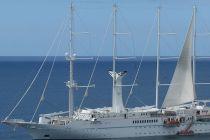
Windstar announces second Solar Eclipse-themed cruise for August 2026
A total solar eclipse is a rare and remarkable phenomenon, and observing it at sea—particularly at sunset—offers an unobstructed and...
April 2, 2025 - Cruise Industry

Carnival Corporation expands renewable energy efforts with new solar parks in Roatan and Cozumel
Carnival Corporation & plc has expanded its renewable energy initiatives with the launch of solar parks at Mahogany Bay Cruise Center in Roatan...
March 20, 2025 - Cruise Industry
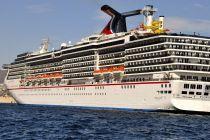
CCL's ship Carnival Spirit returns to service following drydock refurbishment
Carnival Spirit has returned to the water following a month-long dry dock, emerging with several enhancements designed to elevate the guest...
March 18, 2025 - Cruise Industry
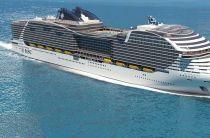
MSC Cruises opens bookings for 2026-2027 winter voyages
MSC Cruises has officially opened bookings for its Winter 2026-2027 season, featuring an extensive deployment across the Caribbean, the Bahamas, and...
March 7, 2025 - Cruise Industry
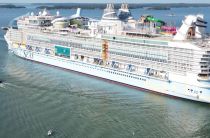
RCI-Royal Caribbean's 3rd ICON vessel to be named Legend of the Seas
RCI-Royal Caribbean has announced the latest addition to its ICON Class fleet - Legend of the Seas, set to commence operations in Europe during the...
February 19, 2025 - Cruise Industry
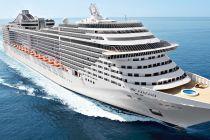
MSC opens new cruise terminal at Port Barcelona (Spain)
MSC Cruises has officially opened Terminal H, its new cruise terminal at the Port of Barcelona’s Moll Adossat. The facility welcomed its first...
February 15, 2025 - Cruise Industry
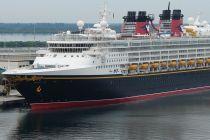
DCL-Disney Cruise Line expands 2026 offerings with new ships and destinations
DCL-Disney Cruise Line has announced its 2026 deployment, featuring expanded itineraries in Alaska, Europe, the Caribbean, and Southeast Asia. The...
February 13, 2025 - Cruise Industry
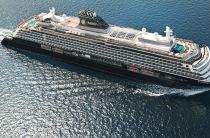
MSC Explora Journeys introduces Grand Journeys for 2025-2026
Explora Journeys announced its Grand Journeys collection scheduled for 2025 and 2026, featuring extended itineraries across oceans and continents...
February 4, 2025 - Cruise Industry

Spain welcomеd 12.8+ million cruise passengers in 2024
In 2024, Spain's maritime sector experienced a significant surge, welcoming 12.8+ million cruise ship tourists - a 6.7% increase over 2023. The...
February 3, 2025 - Cruise Industry
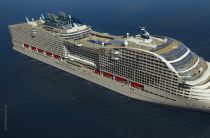
MSC Cruises opens sales for MSC World Asia ship’s Mediterranean voyages (2026-2027)
MSC Cruises opened for booking the inaugural voyages of MSC World Asia - MSC's newest vessel from the WORLD-Class fleet. The ship will enter service...
January 31, 2025 - show more news
